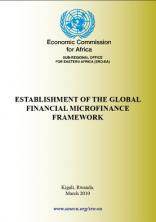Establishment of a global financial microfinance framework

Many of the people of the Great Lakes Region live below the poverty line and one of the causes of this situation is the population’s lack of access to means of production, of which loans is a vital component. However, it is a fact that today, in the region, a number of decentralized financial institutions, NGOs and governments are endeavouring to coordinate their efforts in trying to overcome this bottleneck, by coming up with sectoral policies in development, and by providing support to micro finance activities in the fight against poverty and making efforts to revive growth in order to achieve the Millennium Development Goals.
This Study covers ten[1] of the countries comprising the International Conference on the Great Lakes Region and is meant to jointly assist the Economic Commission for Africa and the International Conference on the Great Lakes Region in preparing a project document to be submitted to the member countries to be used in formulating concrete policies and measures to be adopted in the field of the fight against poverty and mainly in setting up a mechanism for the collection of data and competencies, in order to be able to finance and to strengthen the micro finance institutions operating within the region.
From the documentary review, from the consultations[2] with the various actors, and from the visits made to the various countries, it is obvious that in their efforts, the major actors in this sector in the Great Lakes Region have, at different levels, accummulated various levels of experience in this matter and it will be useful to draw from this diverse experience, the general positive elements that could be used as examples in the other countries in the region, in their respective approaches in offering support in the fight against poverty through micro finance.
Access to financial services and, subsequently, to micro finance loans, still remains a major problem to resolve, comparing the population living in poverty and the rate of coverage of micro finance institutions in the community. Thus, there is a huge demand awaiting to be reached.